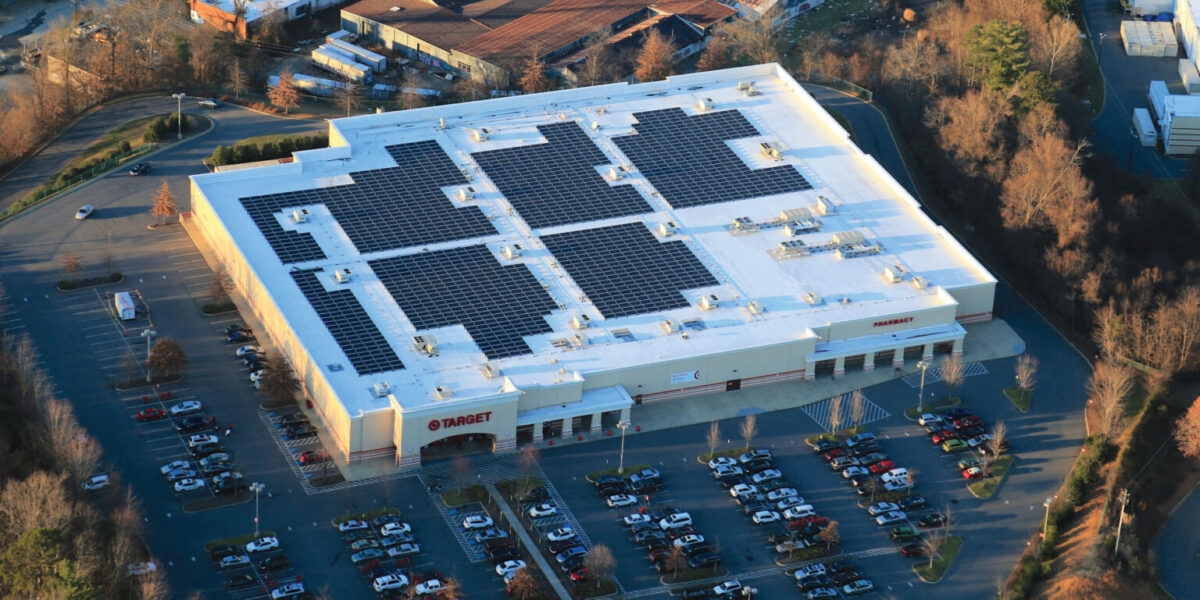From pv magazine USA
US retailer Target, known for being ahead of the sustainability curve, has solar installed on nearly 550 locations or more than 25% of its stores. The company’s sustainability strategy, called Target Forward, commits the retailer to net-zero greenhouse gas emissions enterprise-wide by 2040.
According to the Solar Energy Industries Association (SEIA) Solar Means Business 2022 Target is one of the top four companies for solar installed on site, which—at the time—amounted to 255 MW of capacity.
To stay ahead of the curve, Target decided to update the solar equipment on a Target facility in Los Angeles. While manufacturers often claim that solar modules last 20 to 30 years, they degrade over time. In research conducted at the National Renewable Energy Lab, for example, it was found that solar modules lose about 0.5% of output each year. At that rate, 20-year old solar modules would be producing about 90% of their original output. In addition, new technologies offer higher output, and corporations such as Target may find it cost effective to decommission older technology and replace it with new.
The Los Angeles Target installation consisted of legacy Shell Powerlight modules, Xantrax inverters, and an integrated PowerGuard flat racking solution. The entire project, including all system equipment, was removed in three weeks by Decom Solar LLC, a company that specializes in decommissioning. The 360 kW installation is being replaced by a new, state-of-the art system by PowerFlex, a national provider of onsite sustainable energy solutions.
Decom reports that it guarantees that all solar equipment they work with will be properly redeployed, reinstalled or recycled, and in this case they chose Solarcycle for recycling. Upon completion, a certificate of recycling will be provided as proof of proper handling.
“PowerFlex continues to demonstrate its commitment to sustainability, and this is one of many projects we have worked with a company to safely and responsibly decommission projects,” said Stephen Burns, co-founder of Decom Solar. “This is an important step in reducing our environmental impact and creating a more sustainable future for all.”
All modules from the project have been transported to Solarcycle’s recycling facility in Odessa, Texas, where the modules will be processed, recycled, and reintegrated into the supply chain. Solarcycle was founded in 2022 by industry experts from leading corporations and institutions such as Solaria, NEXTracker, Sierra Club, and the University of New South Wales.
The company said its recycling solution can recover more than 95% of vital materials that can be reused. Its technology allows it to extract metals including silver, silicon, copper, and aluminum and to recycle or repurpose 95% of panels currently in use. In April the U.S. Department of Energy awarded Solarcycle a $1.5 million research grant to study the process for recovering higher-quality metals and materials extracted from retired solar panels. This came on the heels of a $30 million funding raise.
“Commercial stores not only hold huge potential to generate renewable energy, but they can also help our country build a solar circular economy through recycling commitments,” said Jesse Simons, CEO of Solarcycle.
Decom promises to plant one tree for each solar module removed, so after this decommissioning project, the company reports that it donated 4,795 trees to One Tree Planted, a 501(c)(3) nonprofit dedicated to global reforestation.
This content is protected by copyright and may not be reused. If you want to cooperate with us and would like to reuse some of our content, please contact: editors@pv-magazine.com.




When was it first built?
I’m impressed that Target, a major retailer, is working to replace their old solar system with newer and more efficient technology.